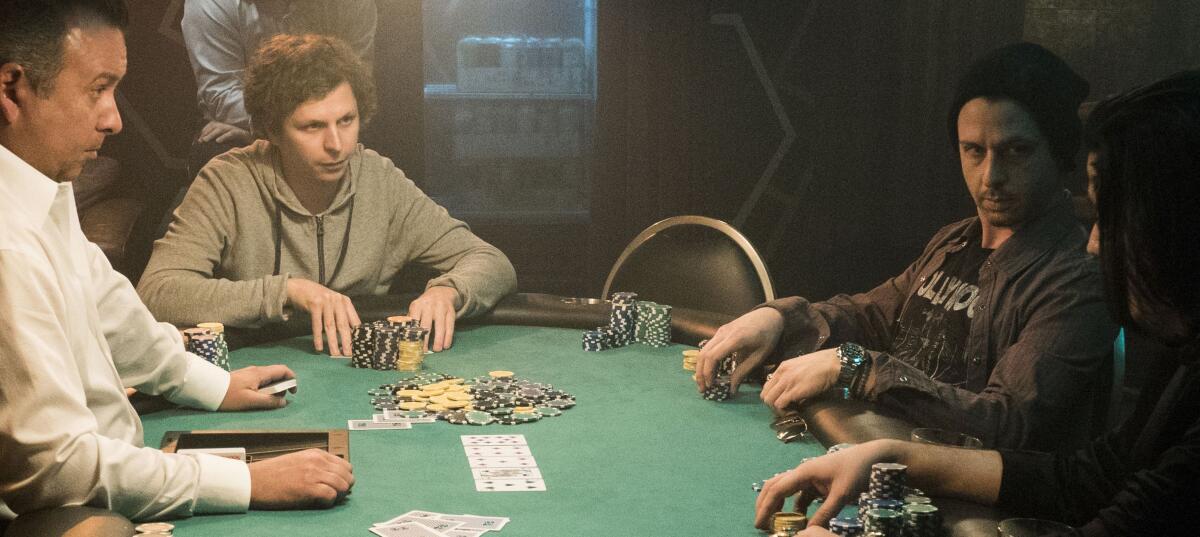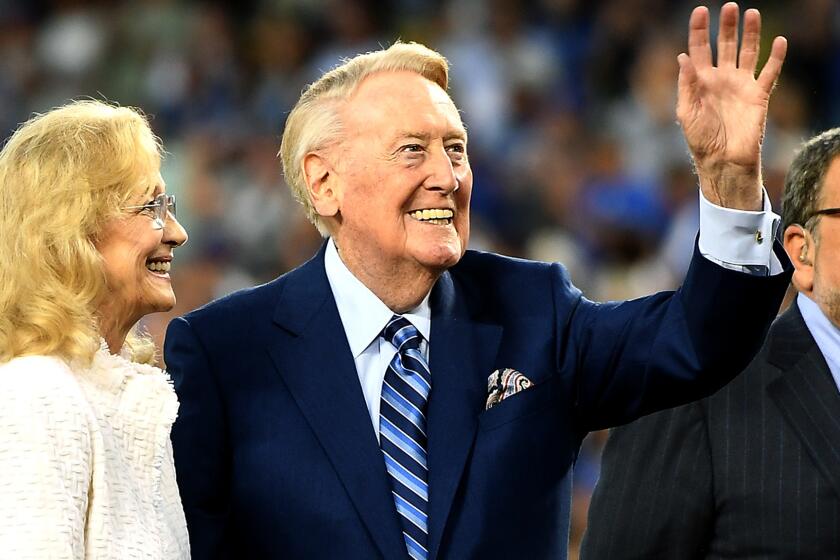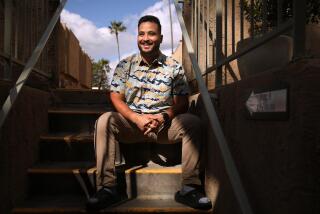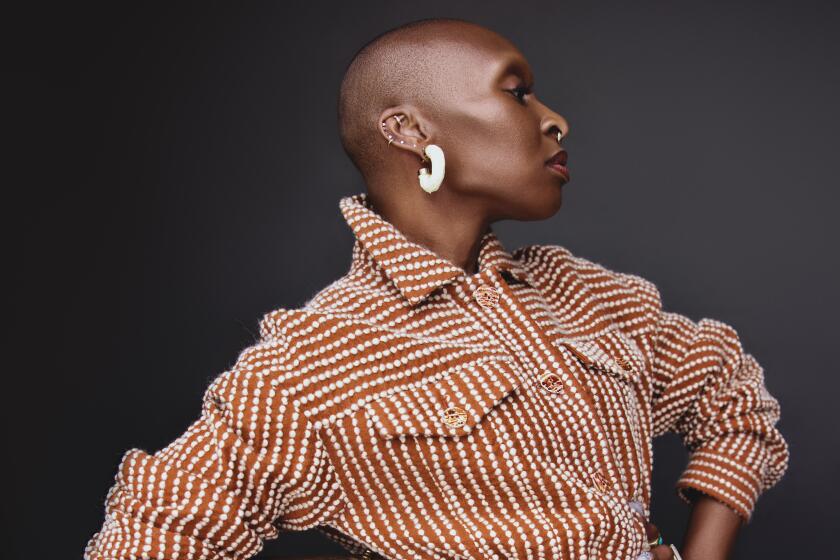How a Hollywood poker game keeps the camaraderie — and trash talk — going on Zoom
- Share via
I don’t care who you are or what you do, everybody has already lost something to the virapocalypse. Personally, I’ve lost lots. So much that as I stood there, counting dust-covered packets of Ramen by the light of my smoldering stock portfolio, I wondered what I was missing most. Restaurants. Sure, who didn’t love eating out? Retirement security, yes, that was nice while it lasted. Sports … I must say, it was shocking to realize what a hole the loss of Premier League Soccer put in my weekends.
And yet, as each of these practical and emotional touchstones was stripped from me — like some cruel future serial killer kid pulling the legs off an ant one by one — none seemed unrecoverable. But flicking through the endless abject horror of my news feed, the thing I found myself missing the most intensely was my Sunday night poker game.
I know how that makes me sound, so let me add some context. I’m a middle-aged screenwriter with a family to support, an achy knee and a tiny piece of metal holding open one of my coronary arteries. Like any good self-loathing artist, I spend most days hiding under my bed waiting for the fraud police to kick in my door. So let’s just say I didn’t have much carefree time before COVID-19 showed up.
But now that it’s here, I’ve become — to paraphrase Sonny Corleone — a perpetual wartime consigliere. I suspect we all have (except for those Gen Z gaggles partying at spring break). How could we not? The threats are multifaceted and ever-present. They are so real, and present such a heavy burden to bear, that all of us are wondering if we’ll ever have a respite again.
Just because you’re staying home doesn’t mean you have to be lonely. How to set up video chats for a dinner party, game night, karaoke session and more.
And that’s why I missed my poker game so much. For the past 20 or so years, every Sunday night from 6 to 11, no matter what was happening in the world, my group of friends and I gathered at my home in New York (or at actor, writer and professional contrarian Hank Azaria’s) to play poker. And, yes, while cards were dealt and money changed hands, the game play was ancillary to the true objective of our gathering — which was to enjoy a communal respite from the endless demands of the angst-riddled, high-wire-act lives we lead.
Our poker group — which was started by a few of us who once played at the storied high-stakes tables captured on film in “Molly’s Game” — has grown into an eclectic collection of misfits and yahoos, many with strong roots in the entertainment industry. Regulars over the years have included Hank, David Schwimmer, Eric Bogosian, Irv Gotti, Billy Crudup, Aaron Tveit and writer-director Brian Koppelman. We also have our fair share of lawyers, editors, finance jerks, tech guys; Ed is a masseuse, Jim’s an OB-GYN.

As varied as we are, we all stick to two simple yet stringent rules: (1) No politics at the table. And more important, (2) You cannot be unfunny. Take the game too seriously — as a few have over the years — and you’ll never be invited back.
Don’t get me wrong, we take poker seriously. We play for reasonable stakes. But your primary objective cannot be the game. And because of that, our gatherings are generally joyous gumbos of movie quotes and good-natured insults. Mat Guliner speaks mostly in “Godfather” quotes, but as Tony Montana. Jim mutters so many undermining insults that we had to buy one of those handheld pitch counters to keep track (his record is 104 insults in a six-hour game).
Hosting at my house for as long as I have, I have felt these players gradually become part of the fabric of my family. They have watched my boys grow up and now consider them friends. My endlessly understanding wife, Kate, has become a den mother of sorts, serving as the gold standard of warmth and generosity by which all the single guys measure their potential romantic entanglements.
Everybody looked forward to Sunday nights.
But all that changed last month when I got a call from Ben tenOever, a microbiologist who runs a lab at Mount Sinai medical school in New York. As a concerned friend, Ben told me that when scientists are trying to test the communicability of a virus, they often have the subjects of the experiment play cards. “It’s the perfect vehicle for viral transmission,” he said. “Ten people crammed around a small table. Everybody touches the chips and cards — it’s like a viral transmission orgy.”
Skeptic that I am, I did my own research, and you know what? It turns out the PhD who has spent his life studying viruses actually knew what he was talking about. Other than teaching a CPR class, you couldn’t design a better coronavirus transmission system than a night of poker. So, as unbearable as the thought was, I made the decision in February that until the angel of death passed over, Sunday night poker would have to be put on hold.
Legendary Dodgers announcer Vin Scully says the coronavirus outbreak is unlike anything he’s ever seen, but he finds hope in a time of despair.
And for three weeks, the game was dark. Every day one of the players would send me some desperate text full of despair and hopelessness. “I can’t believe how much I miss the game,” one text read. “Losing my grandmother was easier than losing the game,” another pal said.
In the absence of the game, we all have now come to understand the purpose it actually served. Honestly, the game was a group therapy session where players could air their grievances about work, relationships, parenting, getting old … whatever they wanted. Marriages have been saved and scuttled, promotions earned, connections made, TV shows packaged and sold, all across the green felt of our poker table.
We became one another’s support group. Most of us are too stubborn or stupid to realize that we are in desperate need of psychotherapy, so the game is all we had. And we didn’t have that anymore. Which is what made its absence inordinately tough to deal with for all of us at a time when we all desperately need some kind of support. Without the game, very few of us knew where to turn. What it sounded like to me, as more and more texts rolled in, was that each of us had fallen into a depression.
Last week, I began getting work emails again. A video conference was set up for a TV show I’m writing. And as I opened Zoom and saw nine faces staring back at me, it hit me that we players too could take advantage of such a platform: We could set up the game on one of the many non-gambling poker sites, connect through Zoom and settle up with Venmo.
Even the thought of it lifted me. So I put all 14 regulars on a group text and floated my idea. Within five minutes, every one of them wrote back with some variation of “yes,” “thank God!” or “This is as happy as I’ve been in weeks.”
Last Sunday night, when 6 o’clock rolled around, Kate and I — together with our boys, Georgie and Lucky — opened the app, and there were the guys I’d seen pretty much every week of my life, staring back at me from that “Brady Bunch” tick-tack-toe grid. Everybody was beaming but nobody said a word. Then, one after another, we all (Kate and the boys too) just started laughing.
And look, I don’t want to say that suddenly all the strife and tragedy in the world disappeared for the briefest of seconds — it didn’t — the Earth is still a plague-riddled disaster area, but for the first time in many weeks, we all were thinking about something else.
The virtual cards were dealt, money was won and lost, and after a few hands the jokes started up. Matt, during his quarantine, had expanded his range and started doing lines from “Mad Max: Beyond Thunderdome,” but as Buffalo Bill from “Silence of the Lambs.” Guys were laughing so hard they started to feel hot. Maybe too hot. Like we had fevers … So we all pulled out our thermometers and bet on who had the highest temperature.
Aaron won that bet. He was feeling pretty sick, and we all knew he was awaiting the results of a COVID-19 test, which he announced on Monday was positive. But he’s on the mend and has already RSVP’d yes for next Sunday’s game.
Andy Bellin is a writer and director whose films include “Trust,” a onetime professional poker player and the author of “Poker Nation: A High-Stakes, Low-Life Adventure Into the Heart of a Gambling Country.”
More to Read
The biggest entertainment stories
Get our big stories about Hollywood, film, television, music, arts, culture and more right in your inbox as soon as they publish.
You may occasionally receive promotional content from the Los Angeles Times.











